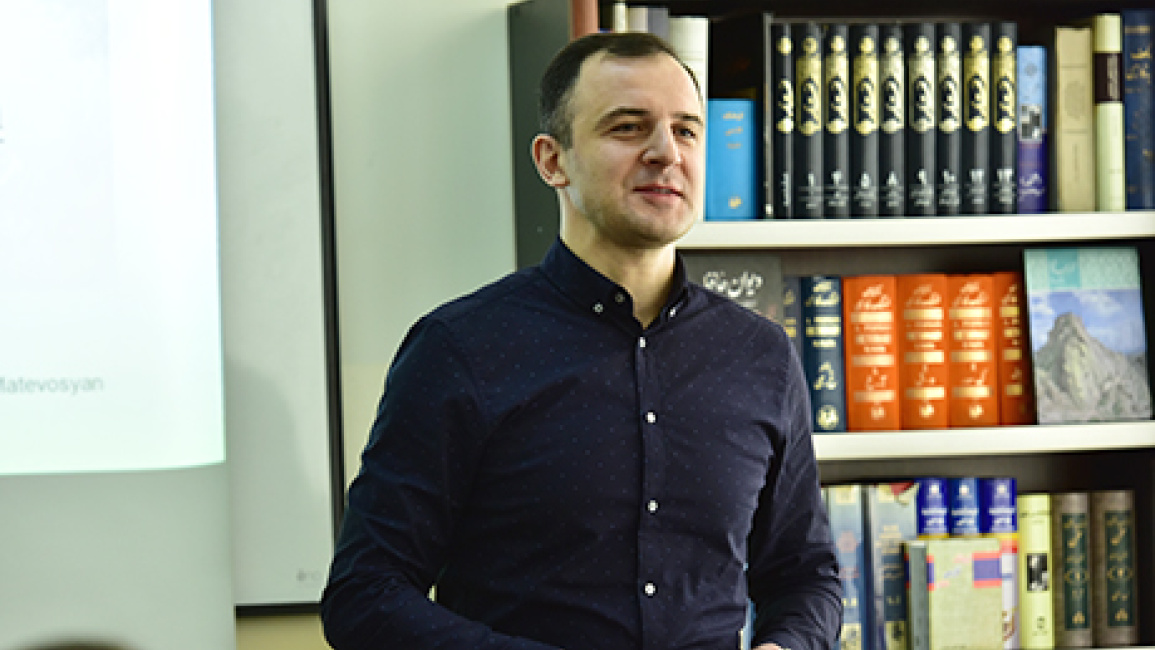- Main
- Node
- HOW TO BE PUBLISHED IN INTERNATIONAL PERIODICALS?: EXPLAINES VAHRAM TER-MATEVOSYAN
March 14, 2019 | 15:13
Science
HOW TO BE PUBLISHED IN INTERNATIONAL PERIODICALS?: EXPLAINES VAHRAM TER-MATEVOSYAN
YSU Faculty of Oriental Studies organized the seminar-discussion related to peculiarities of being published in international periodicals.

The seminar was conducted by the head of the Chair of Political Studies and International Relations of American University of Armenia, DrPhil Vahram Ter-Matevosyan.
The Dean of the Faculty of Oriental Studies, Professor Ruben Melkonyan, representatives of the faculty, master and postgraduate students were present at the event.
In his greeting speech Ruben Melkonyan expressed gratitude to the speaker and stressed the importance of the theme selection, as nowadays, the competitiveness in the field of science is based on the publications in prestigious periodicals.
“On the one hand, we certainly shouldn’t fetishize publications in periodicals, on the other hand, it is one of the important elements forming the 21st century scientists. If we want our science to be competitive we must pay particular attention to prestigious periodicals and being published in them”, said the Dean of the Faculty.
Dr. Vahram Ter-Matevosyan spoke about the necessity of being published and marked that this issue is somewhat problematic as scientists have to divide their time and attention trying to combine their work as lecturers with writing articles and the long process of being published. The speaker presented the small number of articles belonging to humanitarian and social spheres: in 1996-2017 their number was 662 of 15450 features.
Vahram Ter-Matevosyan presented the applications which make it possible to find the themes and scientists. He stressed the necessity of finding corresponding periodical as the rate of “Impact factor” showing the influence of articles and journals is very important.
The speaker also referred to such phenomenon as false science, when self-proclaimed periodicals apply to different scholars and offer to publish them. According to Dr. Ter-Matevosyan, such periodicals don’t correspond to scientific standards, have no reviewers, critics, often publish and publicize online obviously false articles.
While applying for publication one should be attentive to all standards, as even in case of insignificant inaccuracy the author of the article gets refusal. The refusals are also expected when scholars try to send the same article to various periodicals.
Presenting the process of publication Vahram Ter-Matevosyan also said that it lasts from 6 months to 3 years. Three kinds of replies can be received: acceptance, requirement for making changes and refusal. He also marked the blind review, when the author’s name is deleted from the article and the article is sent to reviewers.
He also referred to the problem of language. Taking into account that scientists often don’t feel confident in their knowledge of English they avoid applying for publication. It’s not difficult to solve this problem: students of English departments can be involved in the process or corresponding commissions are to be created.
Dr. Ter-Matevosyan also told about technical nuances, sending an article for publication, showing the process to those present.

